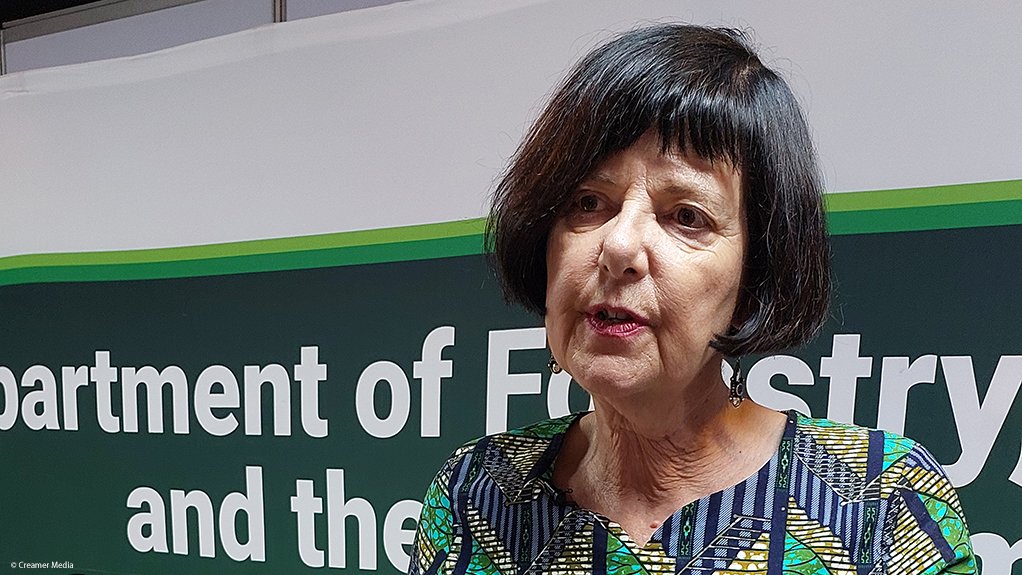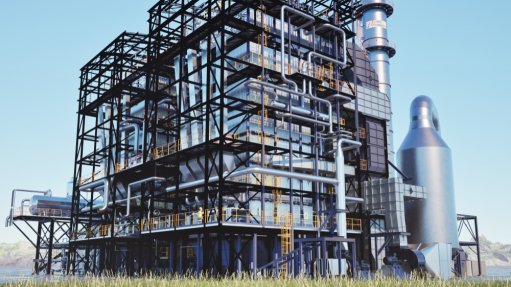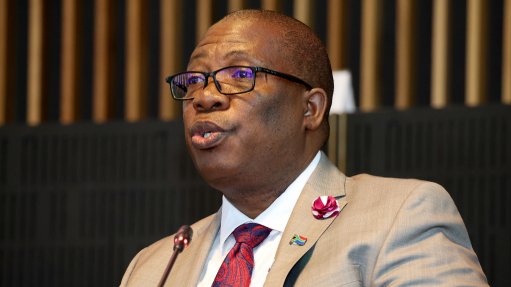South Africa seeks to secure global plastics pollution treaty by balancing competing interests – Creecy
South Africa will seek to secure a legally binding global plastics pollution and marine litter treaty in negotiations at upcoming global meetings by balancing competing demands, Forestry, Fisheries and the Environment Minister Barbara Creecy told the media on April 12.
The Department of Forestry, Fisheries and the Environment will participate in the fourth Intergovernmental Negotiating Committee (INC-4) meeting to be held in Ottawa, Canada, from April 23 to 29, as well as at a subsequent meeting to be held in early December.
With only 85 hours of negotiating time available during the April meeting to secure such a treaty, South Africa will recommend that a lifecycle approach to plastic production, use, recycling and disposal be agreed upon in the first draft of the text of the agreement.
Plastics were versatile and saw use in food preservation, healthcare and automotive industries, among others, but plastics posed risks to human health and ecosystem functioning, Creecy emphasised.
"We strive for the most ambitious solution that can accommodate all parties. This is because international agreements are party-driven, and individual countries have different demands and challenges. Therefore, we have to try to balance the many competing interests in this space," she said during an engagement on April 12 with South African industrial, environmental, civil society, informal sector and local government stakeholders prior to the INC-4 meeting.
South Africa has a significant plastics industry that is targeted for growth as part of industrial policy to provide economic and employment growth. Therefore, it is incumbent on the country to ensure that, as the industry grows, it happens in a socially, environmentally and economically sustainable manner.
The management of plastics across their full lifecycles from manufacturing, use and final disposal is, therefore, of central importance, said Creecy.
"Our negotiating position, as mandated by Cabinet, rests on the Constitution and aims to protect current and future generations," she noted.
The negotiations' obligatory measures include supporting and strengthening waste management services to prevent plastic leaking into the environment, as well as emphasising waste collection and improving recycling systems through the development of extended producer responsibility schemes to collect, reuse and recycle plastic waste with the aim of promoting a circular economy in the plastic industry, among others.
The third obligatory measure included promoting public awareness and clean-up campaigns to remove plastic waste from rivers, wetlands and beaches, she said.
More action was warranted to tackle plastic pollution, Creecy added.
"Building on the principles established from INC-3 to guide our negotiations, the best available science is needed to guide the criteria to inform priority plastic products and their impact on our environment. This scientific information is needed to conclude the annexes of this instrument.
"Additionally, information sharing on chemicals of concern that are used in plastic production needs to be managed in an open and transparent manner," she said.
Further, new global obligations that will be introduced imply that South Africa needs to domesticate these obligatory and regulatory controls to end plastic pollution.
"The obligatory and regulatory measures to curb plastic pollution need to be supported by equally ambitious means of implementation. A financial mechanism that would ensure predictable and adequate financial resources would assist in curbing plastic pollution in developing countries," the Minister said.
"INC-4 provides a platform to streamline the textual options and conclude with obligatory measures that can be agreed to at the fifth session of the INC."
Meanwhile, the challenges of balancing competing interests in terms of plastics pollution and marine litter were highlighted by the discussions among the various stakeholders.
The plastics and chemicals industry representatives highlighted various challenges in terms of a lack of waste collection, while civil society and environmental representatives proposed that plastics and polymer production caps be introduced to drive greater use of recycled materials in plastic products.
Industry association Plastics SA executive director Anton Hanekom highlighted that about one-third of South African households do not receive waste collection services, compounding the problem of preventing leakage of plastics into the environment.
Conversely, environmental advocacy organisation groundWork Africa plastics campaigner Merrisa Naidoo highlighted that virgin plastics remain cheaper than recycled plastics and that this disincentivises the use of recycled plastics in plastic products.
Representing the informal sector, African Reclaimer Organisation chairperson Eli Kodisang said that waste pickers associations would recommend that the draft text of the agreement contain strong language, in the preamble and throughout the text, ensuring a just transition for impacted workers, communities and companies.
Additionally, the informal and cooperative sectors wanted the agreement to include definitions of waste pickers and a just transition, he added.
South African Local Government Association member responsible for waste management Balanganani Nengovhela emphasised that there was a critical need to strengthen waste management services, particularly in relation to municipalities.
"About one-third of households nationally are not receiving waste management services, and in Limpopo, only about 32% of households receive waste management services.
"There has also been snail-paced progress in delivering waste collection services, with an average of 3% improvement each decade. If this same trend continues, it would take 50 years to get to 80% of households receiving waste collection services, if no intervention is brought into the sector," he highlighted.
Meanwhile, trade union federation Congress of South African Trade Unions Parliamentary coordinator Matthew Parks also emphasised that South African workers need a just transition.
"Humanity is having a devastating impact on the planet, the environment, plant and animal health, and humanity itself from the modalities of economic development. These issues especially impact on the working class more than wealthier communities, with fishing communities already feeling the impact.
"There is a sad joke that the Protea has been replaced by the plastic bag as the national flower. Change is needed, but this needs to take into account workers and communities, including the impacts on the downstream value chain and industries," he said.
A global legally binding instrument to curb plastic pollution and marine litter must account for the economic development and resources available within countries.
"The cold reality is that we have 41% unemployment and about 59% youth unemployment in South Africa. In comparison, the US and European countries have an unemployment rate of about 3%," he highlighted.
However, workers were wary of change, especially when unemployment is at 41%. If a legally binding instrument was messily constituted, it would make any change more difficult and, therefore, must recognise the importance of value chains and the impacts on at-risk communities, Parks said.
"Change is urgent, but it must be just and not reckless. However, we have lots of tools available and can easily do an inclusive, win-win approach."
Department of Forestry, Fisheries and the Environment deputy director-general for chemicals and waste management Mamogala Musekene noted that South Africa's policy framework aimed to ensure that every role-player in the value chain had specific obligations and targets to meet.
Meanwhile, in response to Anglican Church of Southern Africa environmental network coordinator reverend Rachel Mash, Creecy said that there was appetite in South Africa's government to introduce integrated chemical regulations, although other regulatory reforms were needed, and that this would have to wait for the seventh administration to tackle.
"This [integrated chemicals regulation] approach would ultimately yield the most value, but it is a difficult process," Creecy said.
Article Enquiry
Email Article
Save Article
Feedback
To advertise email advertising@creamermedia.co.za or click here
Announcements
What's On
Subscribe to improve your user experience...
Option 1 (equivalent of R125 a month):
Receive a weekly copy of Creamer Media's Engineering News & Mining Weekly magazine
(print copy for those in South Africa and e-magazine for those outside of South Africa)
Receive daily email newsletters
Access to full search results
Access archive of magazine back copies
Access to Projects in Progress
Access to ONE Research Report of your choice in PDF format
Option 2 (equivalent of R375 a month):
All benefits from Option 1
PLUS
Access to Creamer Media's Research Channel Africa for ALL Research Reports, in PDF format, on various industrial and mining sectors
including Electricity; Water; Energy Transition; Hydrogen; Roads, Rail and Ports; Coal; Gold; Platinum; Battery Metals; etc.
Already a subscriber?
Forgotten your password?
Receive weekly copy of Creamer Media's Engineering News & Mining Weekly magazine (print copy for those in South Africa and e-magazine for those outside of South Africa)
➕
Recieve daily email newsletters
➕
Access to full search results
➕
Access archive of magazine back copies
➕
Access to Projects in Progress
➕
Access to ONE Research Report of your choice in PDF format
RESEARCH CHANNEL AFRICA
R4500 (equivalent of R375 a month)
SUBSCRIBEAll benefits from Option 1
➕
Access to Creamer Media's Research Channel Africa for ALL Research Reports on various industrial and mining sectors, in PDF format, including on:
Electricity
➕
Water
➕
Energy Transition
➕
Hydrogen
➕
Roads, Rail and Ports
➕
Coal
➕
Gold
➕
Platinum
➕
Battery Metals
➕
etc.
Receive all benefits from Option 1 or Option 2 delivered to numerous people at your company
➕
Multiple User names and Passwords for simultaneous log-ins
➕
Intranet integration access to all in your organisation





















